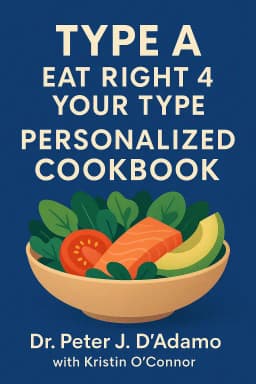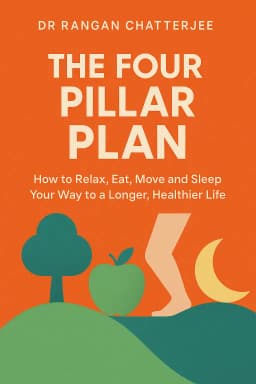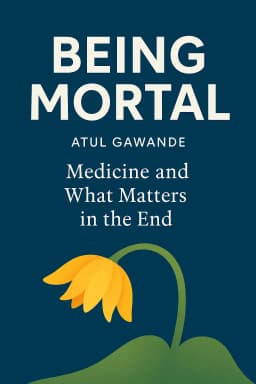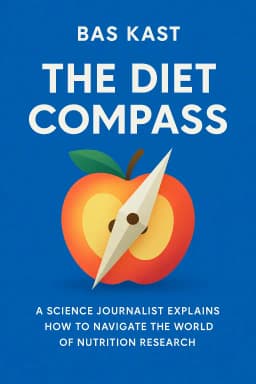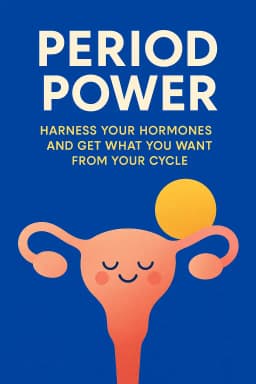
The Period Power Playbook
Golden Hook & Introduction
SECTION
Laura: Alright Sophia, I'm going to say a phrase, and you give me your honest, one-word reaction. Ready? "Period Power." Sophia: Ugh. "Ouch." Laura: Exactly! For most of us, it's cramps, inconvenience, and a monthly bill for tampons. But what if that's the wrong way to think about it entirely? Sophia: I'm listening, but I'm skeptical. The only "power" I associate with my period is its power to ruin a new pair of white pants. Laura: (Laughs) I hear you. But that's the exact mindset that Maisie Hill is trying to dismantle in her book, Period Power: Harness Your Hormones and Get What You Want From Your Cycle. And what's fascinating about Hill is that she's not just a writer; she's a long-time women's health practitioner, an acupuncturist, and a doula. She’s been in the trenches, so to speak, helping people navigate this stuff for years. Sophia: That background makes a lot of sense, actually. Because the book has been both wildly popular—it’s got a huge following online—and also a bit controversial. It seems to live in that space between hard science and more holistic, alternative wellness ideas. Laura: It absolutely does, and that's what makes it such a rich topic for discussion. It forces you to ask what's evidence, what's a useful metaphor, and what's just a new way of paying attention to your own body. Sophia: Okay, I'm intrigued. Where do we even start with unpacking this? Laura: Let's start with the central idea that got everyone talking: this concept of your menstrual cycle having four distinct inner seasons.
The Cycle Strategy: Your Body's Four Inner Seasons
SECTION
Sophia: Right, the seasons. I’ve seen this on social media. Winter, Spring, Summer, Autumn. It sounds nice, but is it just a poetic way of saying you feel bad sometimes and good other times? Laura: It’s much more specific than that. Hill argues that these aren't just moods; they're predictable, hormone-driven phases, each with unique strengths—or as she calls them, 'superpowers'—and potential pitfalls. Think of it less like poetry and more like a biological user manual. Sophia: A user manual I definitely did not receive in my high school health class. Laura: None of us did! Let’s break it down. ‘Winter’ is your period, when your hormones—estrogen and progesterone—are at their lowest. This is a time for rest, reflection, and intuition. Your energy is directed inward. Think of it as a time to review and release. Sophia: Okay, but what does that mean in practice? I have a job, I have deadlines. I can't just check out for five days and 'reflect'. That sounds like a luxury. Laura: It's not about checking out, but about adjusting your expectations. The book shares a great story about a client named Catarina. After tracking her cycle, she realized that during her Winter, she craved solitude. She couldn't listen to music, she found deep conversations annoying, and she had an aversion to being touched. Sophia: Wow, that is incredibly specific. Laura: It is! And once she understood this, she could communicate it. Her partner learned that bringing her a hot drink and giving her space was more loving in that moment than trying to have a big heart-to-heart. It’s not about stopping your life; it’s about knowing what you need and asking for it. It’s like the book’s analogy of a cold, windy day. You can't change the weather, but you can put on a coat and bring an umbrella. Sophia: I like that. It’s about preparation, not avoidance. So what happens when the weather clears up? What’s ‘Spring’? Laura: Spring is the phase after your period, the pre-ovulation phase. Estrogen starts to rise, and with it, your energy, your mood, your motivation. You feel more resilient, more curious, more playful. This is the time to brainstorm, start new projects, learn new things, and be more social. Sophia: Ah, the post-period energy burst! I know that feeling. It’s when I suddenly decide I’m going to run a marathon, learn French, and Marie Kondo my entire apartment in one weekend. Laura: Exactly! And the book points out the danger of Spring: you can feel so good that you overcommit. There's a story about a client, Azizah, who says her Spring is when she's most vulnerable because she feels like she can do anything and takes on way too much. The strategy here is to harness that energy but maybe hold back by about 20%, so you don't burn out before you even get to Summer. Sophia: That is painfully relatable. So you ride the Spring wave into Summer. What’s the superpower there? Laura: Summer is your ovulation phase. This is your peak. Estrogen, luteinizing hormone, and even a little bit of testosterone are all surging. This is when you're most magnetic, articulate, and productive. The book suggests this is the time to give that big presentation, ask for a raise, go on a first date, or lead a big meeting. You’re basically at the height of your powers of communication and connection. Sophia: So you're saying I should schedule all my most important life events for a three-to-five-day window each month? That sounds… complicated. Laura: It's not about being rigid, but about being strategic. If you have a choice, why not schedule that difficult conversation for a time when you know you'll feel more confident and clear-headed? It’s about stacking the deck in your own favor. Sophia: Okay, that makes sense. But we all know what comes after Summer. The dreaded Autumn. Laura: The pre-menstruum. The 'highway to hell,' as the chapter is cheekily titled. This is when progesterone rises and then both hormones start to fall before your period. And this is where the strategy becomes less about maximizing good times and more about navigating the storms.
From Self-Care to Self-Advocacy: Navigating the Cycle's Storms
SECTION
Sophia: Right. This is the part that I think most people struggle with—the PMS, the irritability, the anxiety. Can a 'seasonal' metaphor really help with that, or is it just putting a nice label on feeling awful? Laura: This is where the book moves from a nice framework into a powerful tool for self-advocacy. The argument is that by tracking your 'Autumn,' you stop being surprised by it. You can anticipate it. But more importantly, you can gather data. Sophia: Data? What kind of data? Laura: Your own personal data. The book tells this incredible story about a client named Gemma. For years, she struggled with what she thought was severe anxiety and depression. Her doctor prescribed antidepressants. But she was hesitant. After she started tracking her cycle, she realized her mood only plummeted on very specific days—from day 19 to 22, and right before her period. Sophia: So it wasn't constant, it was cyclical. Laura: Precisely. She also noticed spotting. Armed with this data, she went back to her doctor. Further tests, including a blood test, confirmed she had very low progesterone in the second half of her cycle. Her issue wasn't a generalized anxiety disorder; it was a hormonal imbalance. Sophia: Wow. So she didn't need antidepressants, she needed progesterone. Laura: Exactly. She was prescribed bioidentical progesterone, and her mood stabilized. Her anxiety lifted. That story is the perfect illustration of the book's deeper point. It's not just about feeling good; it's about understanding your body so you can advocate for yourself when something is wrong. Sophia: That’s a complete game-changer. It shifts the conversation from "I feel crazy" to "Here is my data, let's investigate." The book mentions a UK study finding that 80% of women experience reproductive health symptoms, but less than half seek help. This feels like a direct answer to that problem. It gives you the language and the evidence to demand better care. Laura: It does. It’s about building what the book calls 'body literacy.' But this is also where the main criticism of the book comes in. Some reviewers and medical professionals worry that this focus on holistic self-care—like seed cycling or dietary changes, which the book also discusses—could lead people with serious conditions to delay seeking necessary medical treatment. Sophia: That’s a really valid concern. If you have endometriosis, for example, tracking your cycle is helpful for awareness, but it’s not going to cure the underlying disease. There's a fine line between empowerment and medical misinformation. Laura: There is. And I think the author, Maisie Hill, would agree. The book is very clear that severe pain is not normal and should always be investigated by a doctor. The goal of the cycle strategy isn't to replace medical care, but to make you a more informed and active participant in it. It's about knowing when to rest, when to push, and when to raise a red flag and say, "Something is not right here." Sophia: So it's about balance. Using the tracking as a tool for awareness and advocacy, but not as a substitute for a doctor's diagnosis. You become the lead researcher in the N-of-1 study of your own body. Laura: That's a perfect way to put it. You are the primary expert on you. The book is just giving you a framework and a methodology to conduct your research more effectively.
Synthesis & Takeaways
SECTION
Sophia: You know, as we talk through this, it feels like the 'four seasons' metaphor, while catchy, isn't even the most important part of the book. Laura: What do you think is? Sophia: It’s the act of paying attention. The simple, radical act of observing your own body without judgment and treating your experience as valid data. For centuries, women's experiences have been dismissed as 'hysteria' or 'hormones.' This book provides a structure to reclaim that experience and say, "No, this is a predictable pattern, and it means something." Laura: I completely agree. The true power of the book isn't in a magic cure, but in changing the entire conversation we have with our bodies. It reframes the cycle from a monthly inconvenience or a sign of failure—the failure to reproduce, as the book points out—into a source of intelligence. Sophia: It’s about shifting from being a passive victim of your hormones to an active partner with them. And that starts with just noticing. The book quotes that staggering statistic—that despite 80% of women having symptoms, so few seek help. Maybe the first step isn't to overhaul your life according to your 'inner seasons'. Maybe it's just... to track. Laura: Yes! Just to notice. Maisie Hill shares her own story of having debilitating period pain for years. She only realized she was being unkind to her body when she started tracking and saw that she only ever rested when the pain forced her to. That awareness was the first step toward healing. Sophia: So the big takeaway isn't that you need to become a productivity machine in your 'Summer' and a meditating sage in your 'Winter'. It's that you have a right to understand your own body, and you have a right to feel well. And the first step is simply to listen. Laura: Exactly. As Maisie Hill says, "You are the expert in you." This book is a manual to help you become a better expert. It's about reclaiming a narrative that has been stigmatized and ignored for far too long. Sophia: I really like that. It’s less about 'period power' and more about 'personal data power'. Laura: A perfect way to put it. For anyone listening, maybe the first step isn't to download a fancy app or buy a special journal. Maybe it's just to start a note on your phone. Day 1, Day 15, Day 25... how do you feel? What's your energy like? You might be surprised by the patterns you find. Sophia: A simple, powerful action. I think I’ll start today. Laura: This is Aibrary, signing off.
